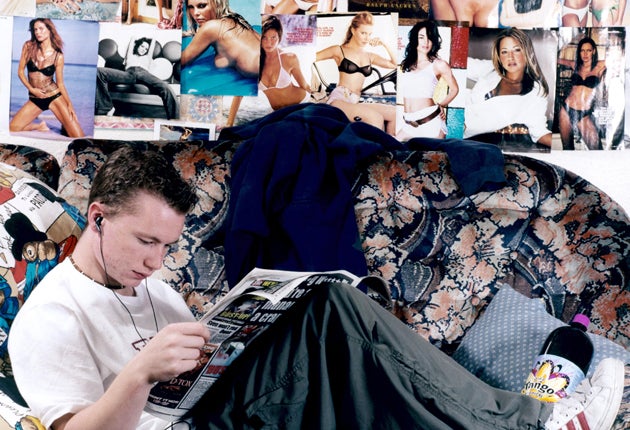Clamp down on lads' mags to avoid 'pornification' of society, says study
Airbrushed images and billboard nudity 'contribute to sexualisation of children'

Your support helps us to tell the story
From reproductive rights to climate change to Big Tech, The Independent is on the ground when the story is developing. Whether it's investigating the financials of Elon Musk's pro-Trump PAC or producing our latest documentary, 'The A Word', which shines a light on the American women fighting for reproductive rights, we know how important it is to parse out the facts from the messaging.
At such a critical moment in US history, we need reporters on the ground. Your donation allows us to keep sending journalists to speak to both sides of the story.
The Independent is trusted by Americans across the entire political spectrum. And unlike many other quality news outlets, we choose not to lock Americans out of our reporting and analysis with paywalls. We believe quality journalism should be available to everyone, paid for by those who can afford it.
Your support makes all the difference.A wholesale crackdown on images of nudity, sex and violence on television, in magazines and on bill boards is today called for by a Home Office-commissioned study which aims to tackle the early sexualisation of children.
The report, by psychologist Dr Linda Papadopoulos, warns that the "pornification" of society has put both girls and boys under unprecedented pressure to conform to gender stereotypes from a younger and younger age. Girls were pressured into appearing sexually available and "hot" while boys were forced to appear macho and to think about women as sexual objects.
Dr Papadopoulos suggested a series of initiatives including:
* Banning the sale of lads' magazines such as Zoo and Nuts from under-15s, and restricting them to top shelves to keep them out of children's eyeline.
* Forcing airbrushed and digitally altered photographs to display ratings symbols to show the extent to which the images had been changed.
* Sexist and stereotyped images of women should be banned from outdoor billboards. All outdoor advertisements to be vetted by local authorities.
* Music videos featuring sexual posing or sexually suggestive lyrics should only be broadcast after the "watershed".
* Games consoles should be sold with parental controls already switched on. Purchasers must choose to "unlock" the console if they wish to allow access to adult and online content.
* Escort agencies, lap-dancing clubs, massage parlours and television sex channels should be banned from advertising vacancies in job centres arguing that it promotes the "normalisation" of the adult entertainment industry as a "viable career choice".
Dr Papadopoulos highlighted a "drip drip effect" where the "previously unthinkable becomes widely acceptable" in modern society.
"Children and young people today are not only exposed to increasing amounts of hyper-sexualised images, they are also sold the idea that they have to look 'sexy' and 'hot'," she said.
"As such, they are facing pressures that children in the past simply did not have to face."
She said the "unprecedented" rise in publication of such images encourages "body surveillance" and "constant monitoring of personal appearance".
This can result in mental and physical health issues, she said.
The report said magazines aimed at young men contributed to the problem.
"Lads' mags contain a high degree of highly-sexualised images of women that blur the lines between pornography and mainstream media," she said.
"The predominant message for boys is to be sexually dominant and to objectify the female body."
The report also called for curbs on magazines targeted at teenage and pre-teen girls arguing that these publications stressed the need for girls to present themselves as sexually desirable in order to attract male attention.
It warned: "Sexualised ideals of young, thin, beauty lead to ideals of bodily perfection that are difficult to attain, even for the models, which perpetuates the industry practice of "airbrushing" photographs. These images can lead people to believe in a reality that does not exist, which can have a particularly detrimental effect on adolescents."
In our celebrity-obsessed society, women are habitually heralded as successful and celebrated for their sex appeal and appearance – with little reference to their intellect or abilities, Dr Papadopoulos said. This "sends out a powerful message to young people about what is of value and what they should focus on", she added.
She said it was unacceptable that stereotyped – and often sexualised – images of women could be displayed on billboards where children could see them when such images would be considered inappropriate in a school or workplace.
The report was commissioned last year by the then home secretary, Jacqui Smith, as part of a strategy tackling violence against women and girls.
Alan Johnson, the Home Secretary, welcomed the report and said the Government would consider the 36 recommendations carefully.
But a spokeswoman for the Department for Culture, Media and Sport said there were no plans to consider age-restrictions on lads' magazines or ratings symbols for photographs.
Subscribe to Independent Premium to bookmark this article
Want to bookmark your favourite articles and stories to read or reference later? Start your Independent Premium subscription today.
Join our commenting forum
Join thought-provoking conversations, follow other Independent readers and see their replies
Comments